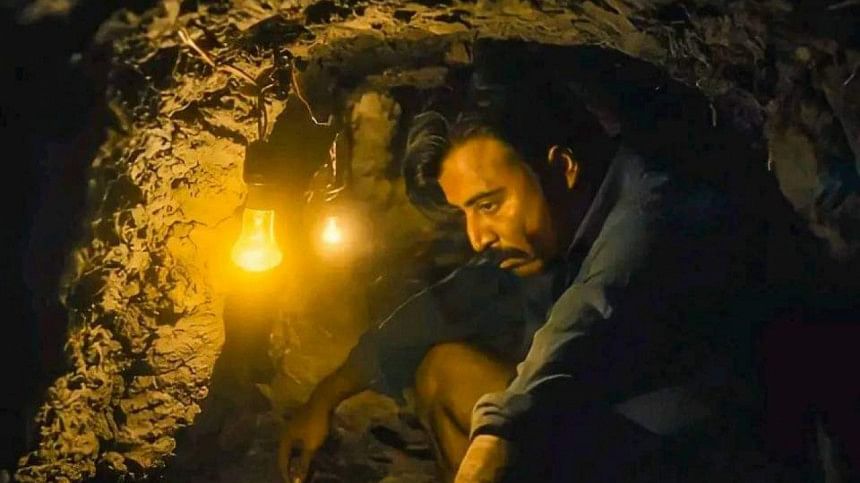Surongo: Nisho’s perfect debut venture

During Surongo's promotion, Afran Nisho mentioned how he always wants to be part of good scripts, no matter the scale. While his entire fanbase kept wondering why Nisho took this long to be launched on the big screen, Surongo is the perfect response to their curiosity.
Director Raihan Rafi draws inspiration from the real-life incident of 2014 when someone broke into the vault of Sonali Bank in Kishoreganj by digging a tunnel. However, that's the only similarity the plot has to the incident.
The story revolves around Masud, played by Afran Nisho, and his love for his wife, Moyna, played by Toma Mirza. After marriage, Masud has a hard time satisfying his wife's unquenchable greed. While Masud goes abroad to earn more for his wife in Bangladesh, Moyna flees with Masud's friend Zahir, played by Mostafa Monwar. When Masud returns to Bangladesh, he eventually confronts his wife and realises Moyna left him because he didn't earn enough to fulfil all her demands. Moyna's greed leads Masud to dig a tunnel to break into the bank's vault and eventually win Moyna back.
The screenplay takes its time in the first half in building up the prime incentive for the protagonist. While a bit slow before the interval, it helps you sympathise with Masud later on and the viewers are rewarded for their patience as the screenplay picks up fast in the second half.
Shahiduzzaman Selim, in his role as the police officer in charge of catching Masud, was extremely enjoyable despite his limited screen time. His Chatgaiya accent, screen presence, and dialogues made the entire theatre liven up every time he came on the screen.
Surongo stands out in its cinematography, colour grading, and set design. After Hawa a few months back, Surongo is yet another visual treat for the local film audience. The efforts of the crew and the pre-production planning were evident throughout the film.
Although the screenplay takes the story to another level, it's the performances that sealed the deal for me. Afran Nisho as Masud is expectedly excellent, especially in scenes where he gets to portray his raw emotions and outrage. The gradual evolution of Masud from desperation to obsession and finally to mania was captured brilliantly by the maestro that is Nisho. However, Toma Mirza was very convincing in her role as she made the audience truly loathe her character. It wasn't Moyna, but rather her greed that was portrayed as the antagonist and even then, Rafi somehow managed to put layers into Moyna's character as well.
However, Surongo has its weaknesses. The background score, especially in the first half, sounded very predictable as every human emotion was backed by a score. The film lacked its share of silence which is crucial in sound design. The songs, albeit beautiful, were extremely loud to the point that the dialogues were inaudible. An item song was used to cater to the masses but felt unnecessary. Some of the edits throughout the film felt choppy.
But the audience is bound to forget these tiny shortcomings owing to the climax and Nisho's presence on the big screen. A runtime of almost two and a half hours might sound long but the jam-packed screenplay with multiple layers to the story makes it the debut Nisho deserved.
Remind Ifti to be quieter at [email protected]

 For all latest news, follow The Daily Star's Google News channel.
For all latest news, follow The Daily Star's Google News channel. 









Comments